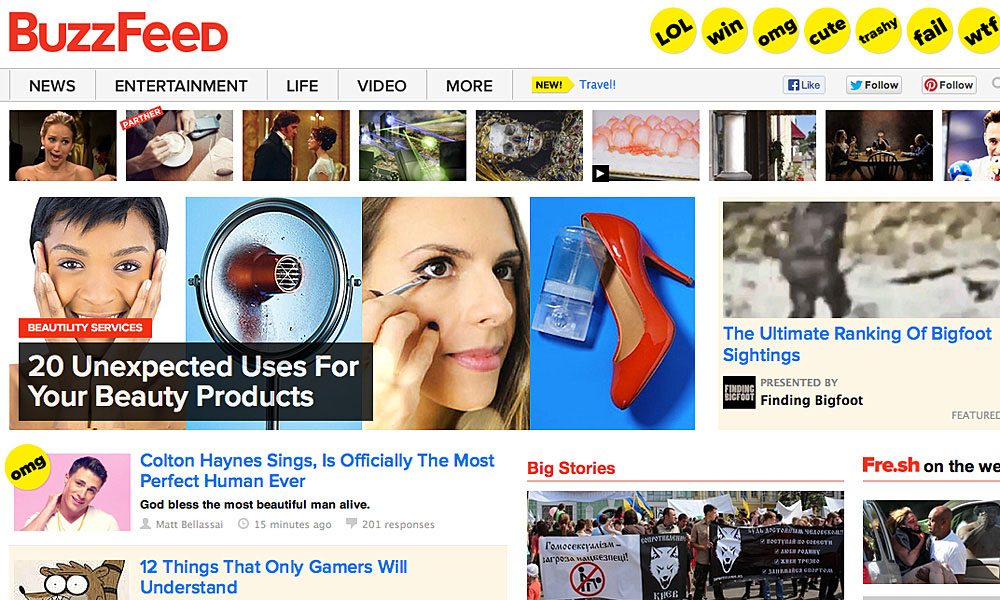Originally published on December 12, 2012
BuzzFeed sees longform journalism as a key part of its future..
By Danielle Levy
BuzzFeed made its bones as the go-to place for viral Internet memes. Then it got serious, hiring Ben Smith away from Politico to lead a foray into political coverage and gaining positive reviews for its efforts on the 2012 presidential campaign.
Now it’s going long, adding longform journalism to its repertoire under the leadership of former Spin magazine Editor-in-Chief Steve Kandell.
Smith and Kandell, who started November, both think that longform journalism has a vital role to play on the Web. The conventional wisdom used to be that people only read short stories and blurbs online, but as the digital media mature, that is no longer the case. “No matter the subject matter, it should have the ability to appeal to a lot of people, and be able to drive home that emotional response,” Kandell says. “This is not radical. It’s Journalism 101. Do stories that people want to read.”
Kandell believes there is a demand for storytelling in the digital world, and that there are plenty of people who can pull it off with style. And he thinks it can be an important component of BuzzFeed.
“People look at the animal photos on BuzzFeed, and somehow that means that we can’t do serious reporting or serious journalism,” he says. “They are completely separate. The animals do really well, and then there [are] the well-written features. I don’t see how those two things can’t coexist. TV networks have sitcoms but also cover breaking news. They have the people who write comedies and the people who write journalism. It is not just this or that.”
BuzzFeed likes those pictures of cute kittens because, in addition to driving traffic, they hit a core feeling, he says, adding, ” ‘That’s great, I want other people to see this,’ ” is a very human instinct.
“We want a feature story that is equivalent to that, not necessarily the heaviness or the cuteness, but the idea that you can read a story and have a reaction that you want other people to see it,” he says.
BuzzFeed attracts more than 25 million monthly unique visitors. Its founder and CEO, Jonah Peretti, was a cofounder of The Huffington Post.
Editor-in-Chief Smith says his goal in embedding longform into BuzzFeed is to combine a healthy supply of content that people love to share with friends with journalism based on traditional reporting values.
“People will share a great longform piece in a magazine, but this isn’t done as much with the Internet because the stuff that is written online often has a lot of passion written into it and does not go through as strong of an editorial process,” Smith says. “Longform is more of a rigorous editing style, and we wanted to take those no-joke values of editing and put them through a filter of what is going to work for the Internet.”
Kandell spent six years at the alternative music magazine Spin and was its editor-in-chief when he was laid off in July. As deputy editor there, he oversaw features and wrote cover stories on artists, among them Bruce Springsteen, Amy Winehouse and U2. Before his stint at Spin, Kandell was an editor at Blender and Maxim. He was a freelance editor at Details before joining BuffFeed.
“At Spin, it came up that longform writing and editing [were] something that people were looking and searching for a lot more closely than a couple of years ago.” Kandell says. “A lot of magazines were folding, and there was this weird dead zone between traditional print and the new digital world.”
With all of the challenges facing print journalism, he says, “there is a new way of taking the things you like about a story and adapting it to the Internet,” Kandell says. “There is a lot of room for expansion and experience. Nothing is radically changing. It is just evolving for today.”
As for the new approach at BuzzFeed, “It is a matter of editors now getting the time and chance to chase down longform stories and fit that into their day-to-day routine rather than short pieces,” Kandell says. “We also want to bring in op-ed writers that wouldn’t usually think of BuzzFeed as an outlet for these stories.”
Kandell challenges another bit of conventional wisdom, saying that the idea of a niche Internet site is also dying. People are realizing that no one site has to cover just one thing, he says, adding that in his view people don’t get news like that anymore.
A New Jersey native, Kandell, 42, is a graduate of the California Institute of the Arts and lives in Brooklyn.
He offers some insight on how a morning commute to work can benefit the BuzzFeed’s goals: Thanks to the rise of the Kindle and the iPad, longform feature stories are perfect for the subway, bus or train ride.
BuzzFeed’s slogan is ‘Worth Sharing,’ and Smith hopes that’s just readers will do with its longform stories.
“We live in a transparent universe where people are sharing, and often the thing that does the best is the best thing written,” he says. ” Our goal is to [offer] the best story, so fantastically written that people want to share it.”
Danielle Levy is a student at the Philip Merrill College of Journalism at the University of Maryland.








Leave a Comment